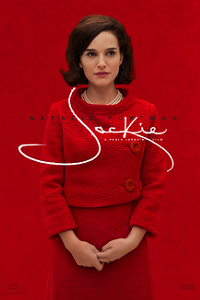♣♣♣♣/♣♣♣♣♣
Massachusetts, 1964. Jacqueline “Jackie” Kennedy (Natalie Portman) is visited by an unnamed Journalist (Billy Crudup) for an interview regarding the assassination of her husband a few weeks prior. Forced to relive the nightmare to indulge the press, she goes on a vivid tour down memory lane back to the tragic day as well as their happy days as a family at the White House. What is shown is a portrait of a woman who had to decide how to swiftly react to such tragedy, playing a delicate balancing act between showing or hiding her grief in public and protecting the legacy not just of her husband’s presidency abruptly cut short but also that of their family as a whole. With two kids in tow left without a father, Jackie must find a way back to normalcy and eventually adjust to life, outside of the White House and away from the limelight.
To be fair, the backlash against Portman not winning an Oscar for this performance seems warranted. Compared to her role as a psychologically tormented ballerina in Black Swan, her rendition of a former first lady forced to pick up the pieces after her husband’s gruesome murder is easily more complex, an equally thrilling showcase of psychological trauma but without the fanfare of a dark thriller. This is probably the barest an actress could go in showcasing a character’s grief without relying too much on the tricks of a particular film genre.
It is also brave of her to tackle the biographical role of a historical figure many consider to be an icon. As far as physical appearance is concerned, Portman looks nowhere near the late Jackie O, and a lot of people have used that to discredit her portrayal. As she mentions at one roundtable interview, taking on such a character requires so much more given that initial obstacle you have to get past, that of convincing everyone to believe that you are this person, before being able to sell the story itself to them.
But what Portman could probably not mimic that much on her own, the hair and make up team takes care of to the best of their abilities. On her part, it is through her voice and enunciation, which is very particular of Jackie, where she does all the heavy lifting. Close your eyes and listen, you probably wouldn’t be able to tell the difference. This works totally to her advantage because once you see the clothes and the hair and hear that voice, whatever is left of your disbelief as far as physicality and facial structure are concerned just goes out the window.
As for the storyline itself, Larraín chooses to focus on a particular moment in the character’s life. In this case, minutes, days, weeks, months post-assassination. Jackie is not really a full-on biography per se, but rather an imaginative interpretation of how she probably was from an emotional standpoint at that specific point of her life. Her interesting story obviously did not end in that timeframe and there is more to tell, but this is perhaps the most intriguing aspect of her life that many are interested in, whatever their reasons are. In this regard, Larraín manages to flesh out the character in an emotionally provocative way.
In the end, the story is still that of grief and moving on. Arguably, perhaps, also a master class on what grace under pressure is supposed to look like. We all know the history, but those are just words written on the pages of many books. Jackie is all about empathy, a sense of feeling, a humanization of the facts as seen through the perspective of the woman who ended up being at the center of it all.









0 creature(s) gave a damn:
Post a Comment